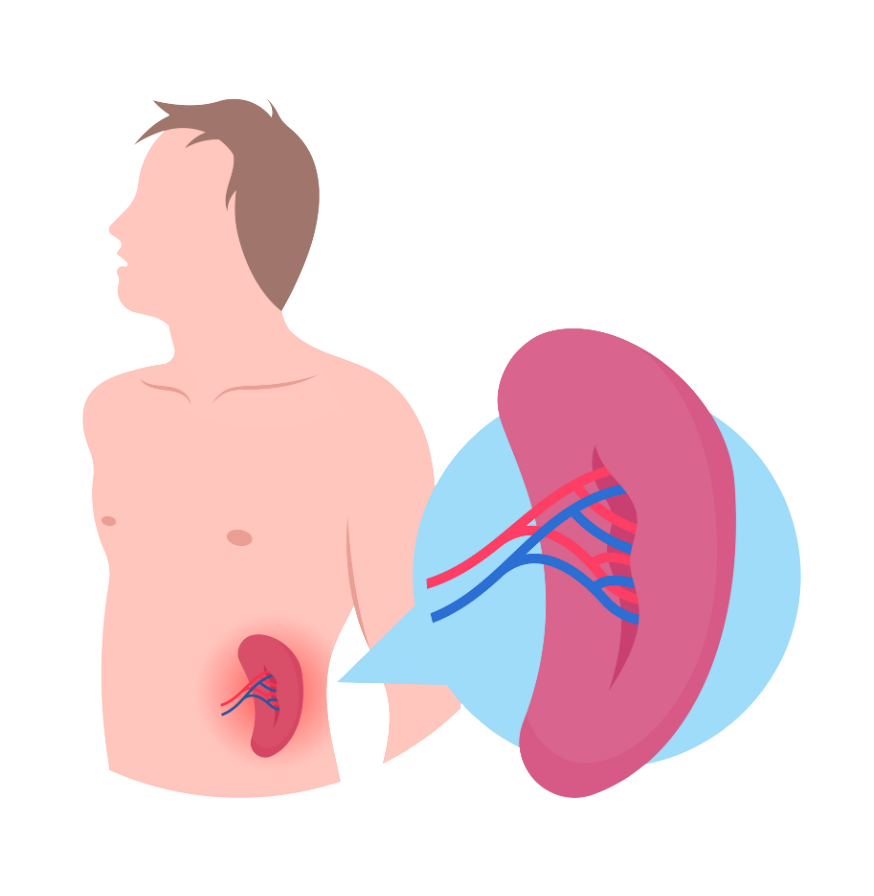+919360391740
gastrosurgeondrkumar@gmail.com
Spleen
- Home
- Spleen

The spleen is a fist-sized organ that is located below the left rib cage and close to the stomach on the upper left side of the abdomen.
Although it’s an essential part of the immune system,people can live without it. This is due to the fact that the liver is capable of performing several spleen activities.
Rupture Or Damaged Spleen
A hard hit to the abdomen, a vehicle accident, a sports injury, or a rib fracture might cause damage to the spleen or cause it to damage or rupture Rupture may occur immediately following the injury or weeks later.
Symptoms of a ruptured spleen include: dizziness, a fast heartbeat (an indication of low blood pressure from blood loss), discomfort behind the left rib cage, and soreness while touching the area.
There are moments when the discomfort is at the very point of the left shoulder as the patients lie down and raise the legs.
Because a burst spleen might result in potentially fatal bleeding, it is a medical emergency.
Splenomegaly
Splenomegaly means enlarged spleen or swelling of the spleen.Swelling may occur in the spleen following an injury or illness. Additionally, diseases like rheumatoid arthritis, leukemia, or cirrhosis might cause it to expand.
Causes Of Splenomegaly
The ethology of splenomegaly is diverse and falls under several categories:
viral infection bacterial infection, including infectious endocarditis or syphilis. metabolic illnesses, including Niemann-Pick and Gaucher diseases. connective tissue diseases, including SLE and rheumatoid arthritis.
Blood clots in the veins of the liver or spleen, or pressure on these veins.
Signs & Symptoms Of Splenomegaly
Because signs of an enlarged spleen are uncommon, most individuals are unaware that they have SPLENOMEGALY. It is often discovered during a physical examination. The most typical signs of an enlarged spleen are as follows:
not being able to finish a large meal feeling bloated, painful, or uncomfortable in the upper left belly; this sensation might radiate to the left shoulder.
Other indications or symptoms might also appear if the spleen is enlarged. They have something to do with the underlying illness. They might consist of indications and symptoms like:
Loss of weight, recurring infections, Easy bleeding, Anemia,Jaundice
Diagnosis
In order to confirm the diagnosis of an enlarged spleen, the doctor may request following tests:
Blood tests, such as a complete blood count, are used to measure the amount of platelets, white blood cells, and red blood cells in the body as well as the function of the liver.
Ultrasound or CT scan are done to ascertain the size of the spleen and whether it is encroaching on other organs. MRI to monitor blood flow via the spleen.
Treatement
The underlying issue is the main focus of treatment for an enlarged spleen. Antimicrobials, for instance, are used in the treatment of infections.
Watchful waiting: The doctor may advise watchful waiting if the patients have an enlarged spleen but no symptoms and no identifiable explanation. In six to twelve months, or sooner if the patients experience any symptoms, patients will need to return for a revaluation with the physician.
Splenectomy
An enlarged spleen may need to be surgically removed (splenectomy) if it causes significant problems or if the reason cannot be found or addressed. In situations that are severe or persistent, surgery could be the best option for recovering.
DR.KUMARAGURUBARAN is one of the Best Doctor in treating patients with SPLENOMEGALY and Spleen related diseases.
Services
- Gerd - Gastroesophagel Reflux Disease
- Hiatus Hernia
- Endoscopy & Colonoscopy
- Cholelithiasis ( Gallbladder Stones)
- Appendicitis
- Jaundice
- Obesity
- Liver Cirrhosis
- Pancreatitis
- Inguinal Hernia
- Umbilical Hernia
- Ventral Hernia / Incisional Hernia
- Anal Fissure
- Anal Fistula / Fistula In ANO
- Hemorrhoids Or Piles
- Laparoscopic Surgery
- Rectal Prolapse
- Gist's - Gastrointestinal Stromal Tumors
- Inflammatory Bowel Disease - IBD -Ulcerative Colitis- Crohns's Disease
- Bowel Perforation - Intestinal Perforation
- Bowel Obstruction - Intestinal Obstruction
- Gastrointestinal Bleeding
- Liver Disorders
- Liver Cancer Hepatoma
- Gastric Disorders
- Stomach Cancer
- Small Bowel Disorders -Small Bowel Intestine Disorders Intra Abdominal Adhsesions
- Small Bowel Cancer ( Small Intestine Cancer)
- Large Intestine- Colon Disorders
- Colon Cancer
- Rectal Cancer
- Meckel's Diverticulum
- Spleen
